Archived Water Damage Blog Posts
Powerful Trash Pumps Impact Fast Water Removal for Wilton Homes
3/17/2025 (Permalink)
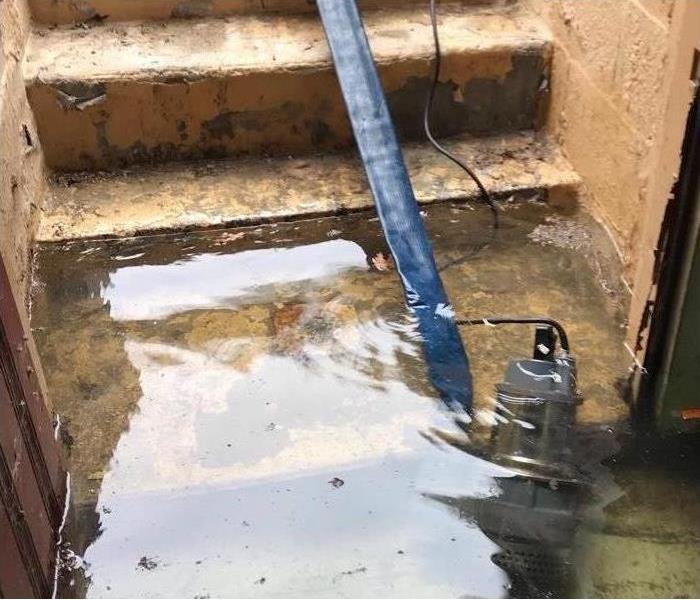 SERVPRO technicians expertly remove water to mitigate damage in Wilton area properties. "Like it never even happened."
SERVPRO technicians expertly remove water to mitigate damage in Wilton area properties. "Like it never even happened."
SERVPRO® Relies on High-Volume Extractors to Save Properties
When water disasters occur, restorers like our SERVPRO team rely on countless tools and equipment. From air movers to manage structural drying to dehumidifiers to regulate indoor humidity, our inventory works in tandem to manage complex extraction, drying, and repair needs for homes and businesses, with equipment like trash pumps leading the process.
The Use of Trash Pumps in Mitigation Services
Gas-powered pumps are a formidable and versatile device intended exclusively for water removal in Wilton homes and businesses. Unlike the regular pumps that can only move water, including high-pressure units and wet vacuums, trash pumps specialize in contaminated water, water with solids and debris, and high-volume extraction needs. The secret to this is the impellers within the machine, drawing in water and debris via the intake line, sending it through the piping, and rapidly discharging it through connected hoses.
The models used by our SERVPRO team can remove thousands of gallons an hour. This high flow rate is vital when several feet of standing water is a concern and is the most efficient path to getting needed restoration and recovery work started promptly. Trash pumps are chosen because of their versatility and dependable results. They require no functional electricity to operate, making them ideal extraction solutions for flooded properties.
Effective Mitigation Starts with SERVPRO
At SERVPRO of Hollis, Peterborough, and Weare, we understand the urgency of water damage threats to your property. Mitigation is one of the biggest priorities of our mobilizing response team, reducing loss and protecting what matters most to families. We stock production vehicles with numerous extraction and water removal tools to provide a range of efficient discharge, including:
- Trash pumps
- Wet vacuums
- Squeegee wands
- Carpet wands
- Weighted extractors
When disasters strike your Wilton home, trust SERVPRO of Hollis, Peterborough, and Weare to help. We are ready 24/7 at (603) 256-9559.
Why Choose SERVPRO for Water Damage Restoration?
12/13/2024 (Permalink)
Water damage can strike when you least expect it, whether it’s from a burst pipe, a severe storm, or an appliance malfunction. When your property is affected by water damage, time is critical. Acting quickly can make the difference between a minor repair and a major renovation. That’s where SERVPRO® comes in—a trusted leader in water damage restoration.
The SERVPRO Difference
At SERVPRO, we understand the stress and disruption that water damage can cause. That’s why we’re here to help 24/7, bringing fast and professional service when you need it most. Here’s what sets us apart:
1. Rapid Response
Water damage doesn’t wait, and neither do we. Our highly trained technicians are available around the clock, ensuring we arrive promptly to assess and mitigate the situation. Our swift response helps minimize damage and reduce costs.
2. Advanced Equipment
We use state-of-the-art equipment to extract water, dry affected areas, and restore your property to its pre-damage condition. From industrial-grade dehumidifiers to moisture detection tools, we have the resources needed for efficient water removal and drying.
3. Comprehensive Services
From initial water extraction to the final coat of paint, SERVPRO offers a full range of services, including:
4. Expert Technicians
Our team is IICRC-certified, meaning they have the training and expertise to handle any water damage situation. We stay up-to-date with the latest techniques and industry standards, so you can trust your property is in good hands.
5. Insurance Assistance
Dealing with insurance claims can be overwhelming. We’ll work directly with your insurance provider to streamline the process and help you navigate the paperwork, ensuring a stress-free experience.
Common Causes of Water Damage
Understanding the most common sources of water damage can help you take preventative measures. Here are some of the top culprits:
Tips for Minimizing Water Damage
While SERVPRO is here to help, there are steps you can take to mitigate damage before we arrive:
Shut off the water source immediately if possible.
Avoid entering areas with standing water for safety reasons.
Remove valuable items from the affected area to prevent further damage.
Contact SERVPRO immediately for professional assistance.
Trust SERVPRO to Make it “Like It Never Even Happened”™
When water damage disrupts your life, you need a reliable partner to restore your home or business. SERVPRO’s expertise, advanced technology, and commitment to customer satisfaction make us the top choice for water damage restoration.
Don’t let water damage take over your property—call SERVPRO today. We’re here to help you get back to normal quickly and efficiently.
When Water Damage Requires Floor Replacement: How SERVPRO Handles the Process
8/20/2024 (Permalink)
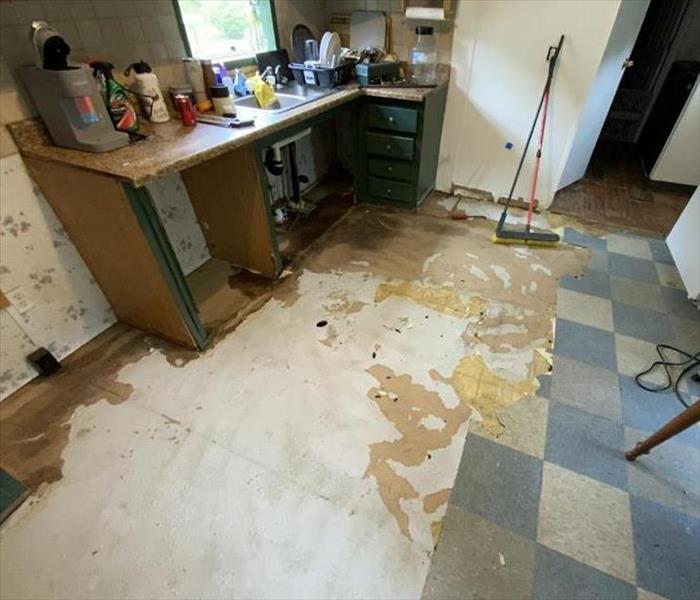 At SERVPRO®, we’re experts in managing water damage and ensuring a seamless restoration process, including when it comes to handling floor damage.
At SERVPRO®, we’re experts in managing water damage and ensuring a seamless restoration process, including when it comes to handling floor damage.
Water damage can be devastating, and sometimes the extent of the damage is so severe that it necessitates ripping up and replacing the flooring. Whether it’s due to a burst pipe, severe flooding, or a leaky roof, the process of removing and replacing damaged floors can be complex and requires a careful approach. At SERVPRO®, we’re experts in managing water damage and ensuring a seamless restoration process, including when it comes to handling floor damage.
1. Assessing the Damage
The first step in addressing water damage that affects the flooring is a thorough assessment:
- Inspection: Our team conducts a detailed inspection to determine the extent of the water damage. We assess the condition of the flooring, subfloor, and underlying structures to understand the full impact.
- Moisture Detection: Using advanced moisture meters and thermal imaging cameras, we identify any hidden moisture that may not be immediately visible but could affect the structural integrity.
2. Containing and Removing Water
Before any flooring can be removed, we need to ensure that the area is dry and safe:
- Water Extraction: We use powerful pumps and vacuums to remove standing water from the affected area. This step is crucial to prevent further damage and mold growth.
- Drying: Industrial-grade air movers and dehumidifiers are deployed to thoroughly dry the area. We monitor the drying process to ensure that all moisture is removed before proceeding.
3. Removing Damaged Flooring
Once the area is dry, we carefully remove the damaged flooring:
- Flooring Removal: Our team removes the affected flooring materials, which could include carpet, hardwood, laminate, or tile. We do this with precision to avoid causing additional damage to the subfloor.
- Subfloor Inspection: After removing the flooring, we inspect the subfloor for any signs of water damage or rot. It’s important to address any issues with the subfloor to ensure a solid foundation for the new flooring.
4. Addressing Underlying Issues
Before installing new flooring, it’s essential to address any underlying issues:
- Repairs: If the subfloor or underlying structures have been damaged, we perform the necessary repairs. This might involve replacing rotted wood or addressing structural concerns.
- Mold Remediation: If there’s any sign of mold, we handle mold remediation to ensure that your home is safe and healthy. This involves removing mold, treating affected areas, and preventing future growth.
5. Installing New Flooring
With the area prepared, we move on to installing new flooring:
- Choosing Materials: We work with you to choose the best flooring materials for your needs and preferences. Whether you’re replacing carpet with hardwood or opting for new tile, we ensure that the materials are suitable for the space.
- Professional Installation: Our experienced team handles the installation of the new flooring with care. We ensure that the installation is done correctly and meets industry standards for durability and appearance.
6. Final Touches and Inspection
Once the new flooring is installed, we perform a final inspection:
- Quality Check: We review the work to ensure that everything meets our high standards and that the new flooring is installed correctly.
- Cleanup: We handle any cleanup related to the restoration process, leaving your home in pristine condition.
7. Preventing Future Damage
To help prevent future water damage, we offer advice and solutions:
- Leak Detection: We provide recommendations for maintaining plumbing systems and detecting leaks early.
- Waterproofing: For areas prone to water damage, we can suggest waterproofing solutions to protect your home.
Conclusion
Dealing with water damage that results in ripping up and replacing the flooring requires a meticulous approach to ensure that the restoration is thorough and effective. At SERVPRO, we handle every step of the process with expertise, from initial assessment to the final installation of new flooring. Our goal is to restore your home to its pre-damage condition, ensuring that it is safe, functional, and beautiful. If you’re facing water damage issues that impact your flooring, contact SERVPRO today to get expert help and peace of mind throughout the restoration process.
Monitoring Dry-Out Progress: Key Metrics for Effective Water Damage Restoration
6/11/2024 (Permalink)
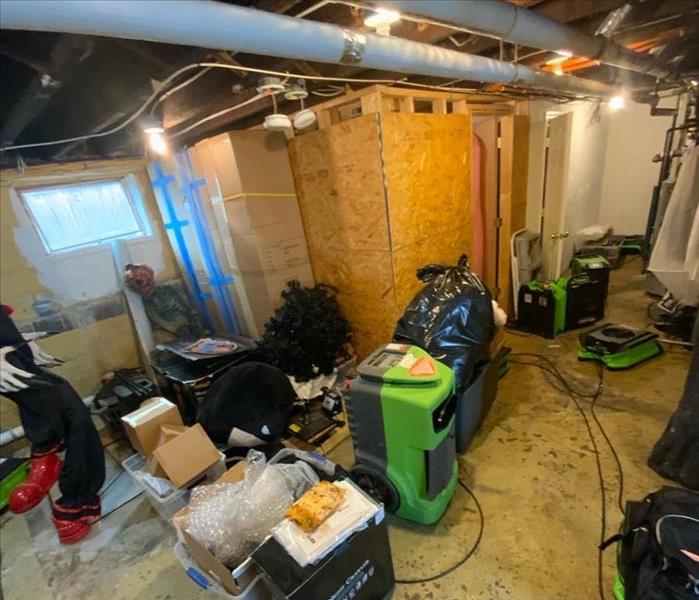 Effective monitoring of the dry-out process is essential for successful water damage restoration.
Effective monitoring of the dry-out process is essential for successful water damage restoration.
In the aftermath of water damage, monitoring the dry-out process is crucial for successful restoration. At SERVPRO®, we employ a range of metrics to assess progress and ensure thorough drying after the initial response. Here's a closer look at the key metrics we use:
1. Moisture Levels:
Moisture Meters: Our technicians use moisture meters to measure the moisture content of affected materials, such as walls, floors, and ceilings. By tracking moisture levels over time, we can determine if drying goals are being met and adjust our strategies accordingly.
Infrared Cameras: Infrared cameras help us identify hidden pockets of moisture that may not be visible to the naked eye. This allows for targeted drying efforts to ensure complete moisture removal.
2. Humidity Levels:
- Hygrometers: Hygrometers measure relative humidity levels in the air. We aim to maintain optimal humidity levels during the drying process to facilitate evaporation and prevent secondary damage, such as mold growth.
3. Temperature:
- Thermometers: Monitoring temperature is essential for promoting efficient drying. Warmer temperatures accelerate the drying process by increasing the rate of evaporation.
4. Drying Progress Documentation:
- Daily Logs: We maintain detailed logs documenting the progress of the drying process. These logs include measurements of moisture levels, humidity, and temperature, as well as observations on the condition of affected materials.
5. Psychrometry:
- Psychrometric Calculations: Using psychrometric calculations, we analyze the relationship between temperature, humidity, and moisture content to optimize drying conditions and achieve faster results.
6. Visual Inspection:
- Visual Assessment: Regular visual inspections allow us to assess the condition of materials and identify any signs of residual moisture or potential issues that may require additional attention.
7. Customer Feedback:
- Communication: We prioritize open communication with our customers throughout the drying process. Customer feedback and observations are valuable indicators of progress and help us tailor our approach to meet their specific needs and expectations.
Conclusion:
Effective monitoring of the dry-out process is essential for successful water damage restoration. By utilizing a combination of metrics, including moisture levels, humidity, temperature, and visual inspections, along with ongoing communication with customers, SERVPRO ensures thorough drying and optimal restoration outcomes. Trust SERVPRO for comprehensive water damage restoration services backed by advanced technology and expertise.
Unseen Perils: The Threat of Slow Leaks in Residential Homes
5/20/2024 (Permalink)
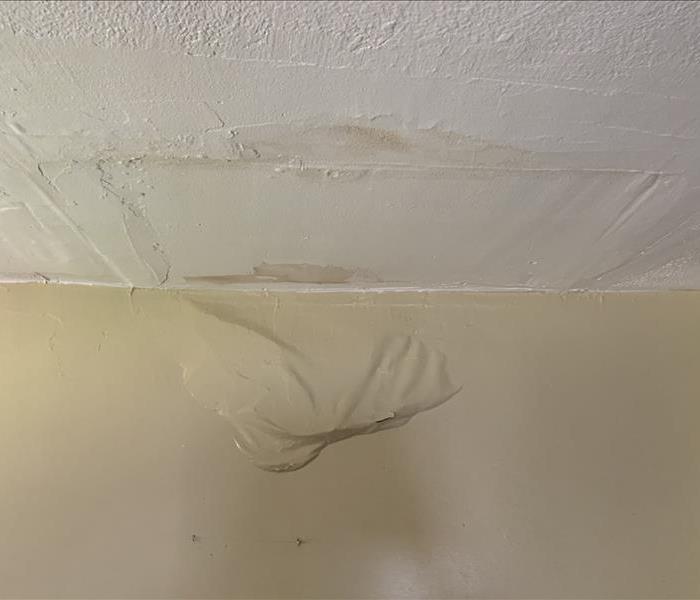 Certified water damage restoration specialists like SERVPRO® possess the expertise, experience, and equipment necessary to locate hidden leaks.
Certified water damage restoration specialists like SERVPRO® possess the expertise, experience, and equipment necessary to locate hidden leaks.
In the realm of household hazards, some of the most insidious threats are the ones we cannot readily see. Slow leaks, often lurking behind walls or beneath floors, pose a significant risk to residential properties, silently causing damage over time and compromising structural integrity. In this blog, we shed light on the hidden dangers of slow leaks and the importance of proactive detection and mitigation measures.
The Silent Menace:
Unlike sudden pipe bursts or catastrophic flooding, slow leaks operate stealthily, gradually weakening building materials and fostering conducive conditions for mold growth. Whether originating from plumbing fixtures, appliances, or hidden pipes, these leaks can persist undetected for weeks, months, or even years, wreaking havoc on homes and exacerbating issues with each passing day.
Structural Damage:
One of the most immediate consequences of slow leaks is structural damage. Prolonged exposure to moisture weakens wooden framework, drywall, and other building materials, leading to warping, buckling, and decay. Over time, compromised structural elements can compromise the stability and safety of the entire property, necessitating costly repairs and renovations.
Mold and Mildew Growth:
Where there is moisture, mold and mildew are sure to follow. Slow leaks create ideal breeding grounds for these fungal intruders, promoting their proliferation behind walls, under flooring, and in other hidden spaces. Left unchecked, mold and mildew can cause not only unsightly stains and odors but also pose significant health risks to occupants, triggering allergic reactions, respiratory issues, and other health problems.
Damage to Personal Property:
In addition to harming the structure of the home, slow leaks can also damage personal belongings and furnishings. Moisture-sensitive items like clothing, furniture, electronics, and documents are particularly vulnerable to water damage and mold growth, resulting in irreversible losses and emotional distress for homeowners.
High Water Bills:
Another telltale sign of a slow leak is a sudden increase in water bills. While the leak itself may go unnoticed, the corresponding spike in water usage can serve as an early warning sign of hidden plumbing issues. Monitoring water consumption and promptly investigating any anomalies can help homeowners identify and address leaks before they escalate into full-blown crises.
Prevention and Detection:
Preventing the consequences of slow leaks begins with proactive detection and mitigation efforts. Homeowners should routinely inspect plumbing fixtures, appliances, and visible pipes for signs of leaks or moisture accumulation. Installing water leak detection devices and smart monitoring systems can provide additional layers of protection, alerting homeowners to potential issues before they escalate.
Professional Intervention:
In cases where slow leaks have already caused damage, seeking professional restoration services is paramount. Certified water damage restoration specialists like SERVPRO possess the expertise, experience, and equipment necessary to locate hidden leaks, assess the extent of damage, and implement comprehensive mitigation and restoration solutions to restore affected properties to preloss condition.
In conclusion, while slow leaks may operate stealthily, their potential for causing significant damage to residential homes should not be underestimated. By remaining vigilant, proactive, and enlisting the support of trusted restoration professionals, homeowners can safeguard their properties against the unseen perils of slow leaks and enjoy peace of mind knowing that their homes are protected from harm.
Power of Precision: SERVPRO®'s Drying Equipment and the Difference Professional Help Makes in Water Damage Restoration
5/13/2024 (Permalink)
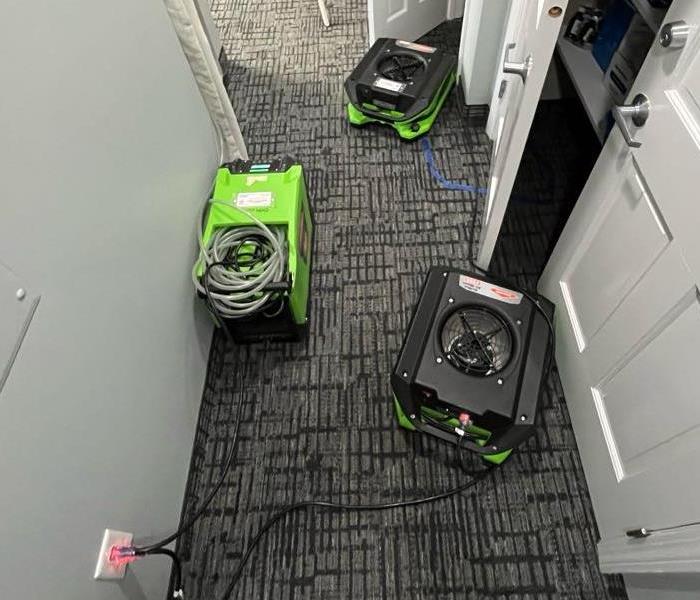 Professional help from SERVPRO® means access to industry-leading drying equipment.
Professional help from SERVPRO® means access to industry-leading drying equipment.
Water damage – it's the homeowner's nightmare that can strike at any moment, turning a tranquil abode into a soggy mess in the blink of an eye. But fear not, for in the arsenal of tools wielded by the heroes of restoration, there exists a secret weapon: SERVPRO's state-of-the-art drying equipment.
Let's take a closer look at the technology behind the magic. SERVPRO's drying equipment isn't your run-of-the-mill fan or dehumidifier – oh no, it's a symphony of precision-engineered machinery designed to tackle water damage with the efficiency of a well-oiled machine.
First up, we have the air movers – the workhorses of water damage restoration. These high-powered fans create a cyclone of airflow, circulating air throughout the affected area and accelerating the evaporation process. Think of them as the wind beneath your wings, whisking away moisture and hastening the drying process with their powerful gusts.
Next on the roster is the dehumidifier – the unsung hero of humidity control. As moisture evaporates from wet surfaces, it lingers in the air, creating a damp and musty environment ripe for mold growth. Enter the dehumidifier, which acts as a moisture vacuum, sucking up excess humidity and restoring balance to the air. With their precision control settings, SERVPRO's dehumidifiers ensure that humidity levels are kept in check, preventing secondary damage and ensuring thorough drying.
But what sets SERVPRO's drying equipment apart from DIY solutions? The answer lies in precision, expertise, and efficiency.
Attempting to dry a water loss on your own with a couple of fans and a dehumidifier from the local hardware store might seem like a cost-effective solution, but it's like bringing a squirt gun to a firefight. Without the proper equipment and expertise, you're fighting an uphill battle against moisture that can seep into hidden nooks and crannies, wreaking havoc long after the visible signs of water damage have disappeared.
In contrast, professional help from SERVPRO means access to industry-leading drying equipment and trained technicians who know how to wield them with precision. With their advanced technology and meticulous approach, SERVPRO ensures that every drop of moisture is eradicated, leaving no stone unturned in the quest for complete restoration.
So the next time water damage strikes, don't go it alone. Trust in the power of precision – trust in SERVPRO's drying equipment and expertise to bring your home back to its former glory, one dry corner at a time.
Fast response to water emergencies.
4/1/2024 (Permalink)
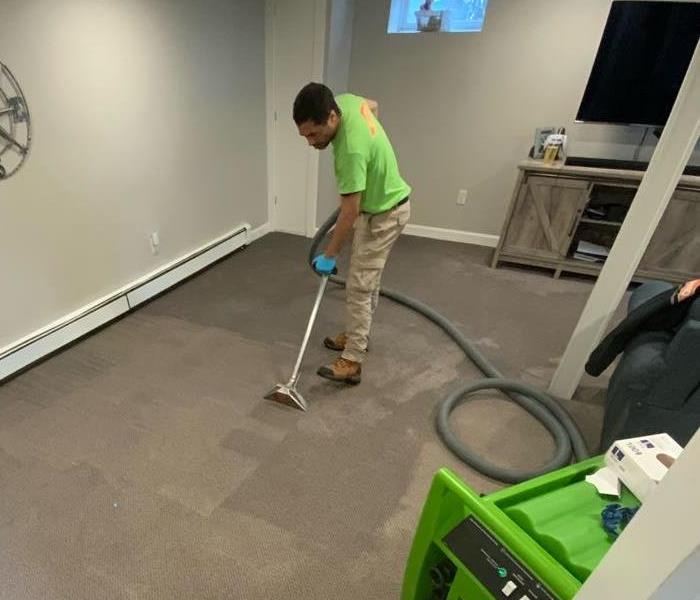 SERVPRO® ensures that water emergencies are addressed swiftly and prioritizes helping property owners get back to normal as soon as possible.
SERVPRO® ensures that water emergencies are addressed swiftly and prioritizes helping property owners get back to normal as soon as possible.
SERVPRO® is renowned for its rapid response to water emergencies, understanding the critical importance of swift action in mitigating damage and restoring properties to their preloss condition. Here's how SERVPRO® ensures a fast response to water emergencies:
24/7 Availability: Water emergencies can occur at any time, day or night. SERVPRO® recognizes the urgency of such situations and maintains round-the-clock availability. Whether it's the middle of the night, on a holiday, or during the weekend, SERVPRO®'s team is always ready to respond promptly to calls for assistance.
Rapid Deployment: Upon receiving a call for a water emergency, SERVPRO® dispatches a team of highly trained technicians to the site immediately. Equipped with specialized tools, equipment, and vehicles, SERVPRO® technicians arrive on the scene ready to assess the situation and begin mitigation efforts without delay.
Assessment and Mitigation: Upon arrival, SERVPRO® technicians conduct a thorough assessment of the water damage, identifying the source of the water, assessing the extent of the damage, and evaluating any safety hazards. They then quickly implement mitigation measures to contain the damage and prevent it from spreading further.
Efficient Water Extraction: Using powerful pumps, vacuums, and extraction equipment, SERVPRO® technicians swiftly remove standing water from the affected area. This helps minimize damage to structural materials, flooring, and belongings, and accelerates the drying process.
Advanced Drying Techniques: SERVPRO® utilizes state-of-the-art drying equipment and techniques to rapidly dry out affected areas. High-speed air movers, dehumidifiers, and moisture detection tools are employed to expedite the drying process and prevent secondary damage such as mold growth.
Thorough Cleaning and Restoration: Once the affected area is thoroughly dried, SERVPRO®'s team proceeds with cleaning, sanitizing, and restoring the property to its preloss condition. This may involve repairing or replacing damaged materials, cleaning and deodorizing surfaces, and restoring contents affected by water damage.
Open Communication: Throughout the restoration process, SERVPRO® maintains open communication with the property owner, keeping them informed of progress and addressing any concerns or questions they may have. This ensures transparency and peace of mind for the property owner during a challenging time.
By prioritizing rapid response and employing efficient mitigation and restoration techniques, SERVPRO® ensures that water emergencies are addressed swiftly and effectively, minimizing damage and helping property owners get back to normal as soon as possible.
 SERVPRO technicians expertly remove water to mitigate damage in Wilton area properties. "Like it never even happened."
SERVPRO technicians expertly remove water to mitigate damage in Wilton area properties. "Like it never even happened."

 24/7 Emergency Service
24/7 Emergency Service




